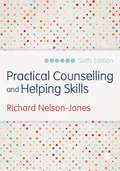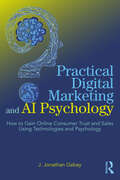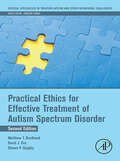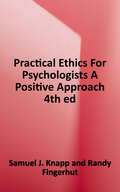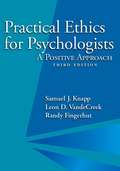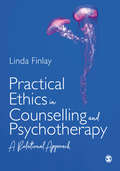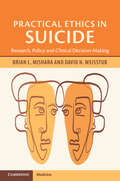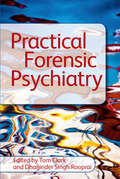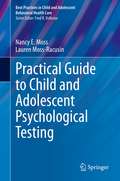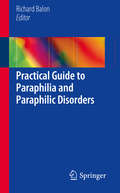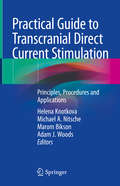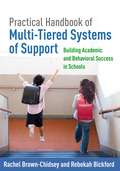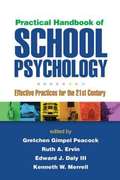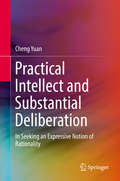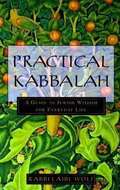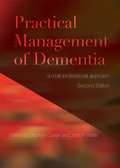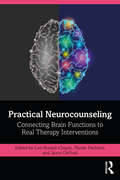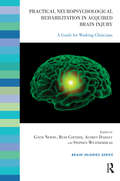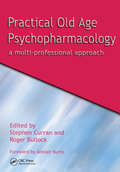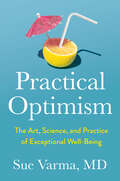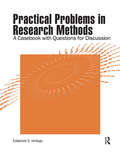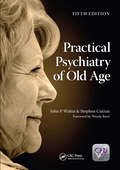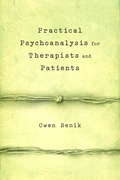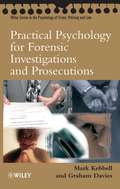- Table View
- List View
Practical Counselling and Helping Skills: Text and Activities for the Lifeskills Counselling Model
by Richard Nelson-JonesThis sixth edition provides a step-by-step guide to using counselling and helping skills with confidence and proficiency. The author's three-stage model of counselling - relating, understanding and changing - is designed to facilitate developing lifeskills in clients and to help them to change how they feel, think, communicate and act. It includes new chapters on 'Technology mediated counselling and helping', with updated research and references throughout. Using practical activities and case examples, the book takes you beyond the basics to more advanced skills, making it an essential companion for all counselling skills courses. Richard Nelson-Jones has many years' experience as a counsellor, trainer and psychotherapist. His books have helped train thousands of counsellors and helpers worldwide. He is a Fellow of the British and Australian Psychological Societies and of the British Association for Counselling and Psychotherapy.
Practical Digital Marketing and AI Psychology: How to Gain Online Consumer Trust and Sales Using Technologies and Psychology
by J. Jonathan GabayPractical Digital Marketing and AI Psychology explores how successful brands utilise both psychology and cutting-edge artificial intelligence technologies to maximise digital marketing strategies.Psychology has long been a foundation for successful marketing strategies, and evolving AI technologies are opening up new opportunities for marketers to help brands build trust and loyalty online. In this exceptional book, award-winning writer Jonathan Gabay delves into fascinating psychological digital marketing techniques and concepts, explaining the practical psychology and science you need to lift your marketing career to the next level. Gabay explores how new technologies can be harnessed to increase their impact significantly. The book provides practical tips and contemporary best-practice examples, including prompt engineering, the psychology behind mission statements and logo design, gamification, the possibilities and pitfalls of social media, among many more areas that will ensure your brand is trusted, valued, and desired.This definitive book is perfect for marketing students up to PhD level and digital marketing, PR, and sales professionals looking for a fascinating, compelling read, packed with ideas and examples, that combines academic excellence with practical advice – all written and presented in a highly accessible style.
Practical Ethics for Effective Treatment of Autism Spectrum Disorder
by David J. Cox Shawn P. Quigley Matthew T. BrodheadPractical Ethics for Effective Treatment of Autism Spectrum Disorder, Second Edition is for behavior analysts working directly with, or supervising those who work with, individuals with autism. The book addresses the principles and values that underlie the Behavior Analyst Certification Board's® Professional and Ethical Compliance Code for Behavior Analysts and factors that affect ethical decision-making. In addition, the book addresses critical and under-discussed topics, including scope of competence, evidence-based practice in behavior analysis, how to collaborate with professionals within and outside one's discipline, and how to design systems of ethical supervision and training customized to unique treatment settings. Across many of the topics, the authors also discuss errors students and professionals may make during analyses of ethical dilemmas and misapplications of ethical codes within their practice. <P><P>New to this revision are chapters on Quality Control in ABA Service Delivery, Ethical Issues in ABA Business Management and Standardizing Decision-making in ABA Service Delivery. - Reviews new BACB Ethics Code for Behavior Analysis - Discusses factors that affect ethical decision-making - Describes how to create systems for teaching and maintaining ethical behavior - Discusses how to identify your own scope of competence in autism treatment - Examines the process of evidence-based practice and how it can be applied to behavior-analytic treatment for autism - Addresses the importance of interdisciplinary collaboration and how to be a good collaborator - Reviews common mistakes that students and supervisors make when analyzing ethical dilemmas, along with common misapplications of ethical codes - Includes new chapters on standardized decision-making and quality control in ABA service delivery
Practical Ethics for Psychologists: A Positive Approach
by Samuel J. Knapp Randy FingerhutThe fourth edition of this seminal book, guided by the APA Ethics Code and a social justice perspective, shows psychologists how to achieve higher standards of ethical practice in their everyday work. Advocating a positive, proactive approach to ethics, Samuel Knapp and Randy Fingerhut go beyond the minimal ethical requirements in clinical practice, research, education, forensic psychology, consultation, and other areas. Through vivid case examples, they explore ethical dilemmas that psychologists must face regarding issues including informed consent, confidentiality, maintaining competence, and protecting the welfare of clients and society at large. The authors present three models to guide psychologists: - the ethics acculturation model for balancing personal and professional ethics; - the five-step decision-making model for navigating complex ethical quandaries; and - the quality enhancement model for managing risk, particularly with patients who may cause harm to themselves or others. This edition offers an enhanced focus on social justice as an ethical responsibility, expanded guidelines related to healthcare technologies, and greater emphasis on psychologist self-care. Psychologists will learn how to collaborate with and empower patients, research subjects, students, and others impacted by their work, ensuring that they are actively engaged in ethical decisions.
Practical Ethics for Psychologists: A Positive Approach
by Samuel J. Knapp; Leon D. VandeCreek; Randy FingerhutPatient Confidentiality; Inappropriate Relationships with Patients; Financial Issues; Informed Consent; Forensic and legal issues.
Practical Ethics in Counselling and Psychotherapy: A Relational Approach
by Linda FinlayThis highly engaging book introduces readers to the ethical dilemmas that therapists may face in their therapeutic practices. By mapping the counselling process from beginning to end, it focuses on key ethical issues such as informed consent, confidentiality, boundaries, the use of touch and dual relationships. It draws on a series of in-depth case studies illustrating ethical dilemmas, and presents the reader with reflective questions at the end of each example. The book covers: The Context of Relational Ethics - Relational Ethics within the Therapeutic Relationship - Exploring the complex judgement demanded by the therapeutic process, and looking at how therapy needs to be situation specific.
Practical Ethics in Counselling and Psychotherapy: A Relational Approach
by Linda FinlayAre you sometimes challenged by how to apply ethical principles in your own practice? Looking to understand what ethical practice can look like from different theoretical standpoints? Linda Finlay takes you on an exploration of ethical therapeutic practice. She highlights how therapeutic decisions depend on the social and relational context and vary according to your theoretical lens. She provides you with guidance on how to engage in therapy relationally while remaining professional, ethical and evidence-based. Split over three parts this book takes you through: - The Context of Relational Ethics - introducing you to the foundational ideas, and considering how professional codes are applied within therapy - Relational Ethics within the Therapeutic Relationship – exploring the complex judgements demanded by the therapeutic process, and looking at how therapy needs to be situation specific - Relational Ethics in Practice – five extended, fictional case studies demonstrate relational ethics in practice, and discuss the issues raised.
Practical Ethics in Suicide: Research, Policy and Clinical Decision-Making
by Brian L. Mishara David N. WeisstubWhen and how forcefully must we intervene to save a life, and when should we respect the will to die? This book presents alternative ethical paradigms to understand contemporary challenges in suicide research, prevention, practices, and policies, including challenges in the expanding legalization of euthanasia and assisted suicide ('medical assistance in dying'). Drawing on case studies and philosophical approaches, analysis focuses on decision-making when we are faced with questions about obligations to help and intervene in suicidal situations. Chapters cover moral dilemmas in rescue policies, ethical challenges in suicide research, civil and legal considerations, and similarities and differences with accessing medical assistance in dying. Discussion is grounded in contemporary debates, addressing important issues such as if we should continue to hospitalize people to protect them from self-harm, or control access to 'dangerous' suicide content online? This book is unique in its focus on the practical concerns of mental health professionals, helplines, researchers, policy makers, and programme planners who are faced with ethical challenges in suicidology and suicide prevention.
Practical Forensic Psychiatry
by Tom Clark Dharjinder Singh RoopraiSuccinct, structured, and focused, this book concentrates on the key facts and practical day-to-day issues vital to forensic psychiatry.Includes fact-oriented practical advice and clinically relevant examples Reflects current practice and the latest laws Provides tips on testifying in legal mattersFeatures a clear bullet point style to help readers
Practical Guide to Child and Adolescent Psychological Testing (Best Practices in Child and Adolescent Behavioral Health Care)
by Nancy E. Moss Lauren Moss-RacusinThis book explains the psychological assessment process and reviews the origins of psychological testing, referral and testing processes, and prominent psychological assessment instruments. Most important, this book details how to evaluate testing data and use them to understand an individual’s needs and to inform interventions and treatments.This book addresses specific domains of psychological assessment, including:· Intelligence and academic achievement.· Speech-language and visual-motor abilities.· Memory, attention/concentration, and executive functioning.· Behavioral and social-emotional functioning.· Developmental status.Practical Guide to Child and Adolescent Psychological Testing is an essential resource for clinicians, primary care providers, and other practitioners as well as researchers, professors, and graduate students in the fields of child, school, and developmental psychology, pediatrics and social work, child and adolescent psychiatry, primary care medicine, and related disciplines.
Practical Guide to Paraphilia and Paraphilic Disorders
by Richard BalonThis book is a concise, practical guide to both paraphilia and paraphilic disorders as defined by the DSM-5 guidelines. Written by experts in the field, the chapters cover the different types of paraphilic disorder as well as the cutting-edge, emerging issues such as online sex. Unlike any other book on the market, the text also covers the most successful treatment strategies, include the therapeutic, hormonal, and psychopharmacological approaches. The book also discusses the ethical, legal, and cultural issues that are common complications when dealing with paraphilic disorders. Many chapters feature an introduction, diagnostic criteria, summary of evidence, clinical example, recommendations, conclusion, and references. Practical Guide to Paraphilia and Paraphilic Disorders is a valuable resource for psychiatrists, psychologists, residents, and all medical professionals working with patients who may suffer from paraphilia and/or paraphilic disorders.
Practical Guide to Transcranial Direct Current Stimulation: Principles, Procedures and Applications
by Helena Knotkova Michael A. Nitsche Marom Bikson Adam J. WoodsThis book provides a comprehensive overview on Transcranial Direct Current Stimulation (tDCS) and the clinical applications of this promising technique. Separated into three parts, the book begins with basic principles, mechanisms and approaches of tDCS. This is followed by a step-by-step practicum, methodological considerations and ethics and professional conduct pertaining to this novel technique. Chapters are authored by renowned experts who also direct and plan tDCS educational events worldwide. Bridging the existing gap in instructional materials for tDCS while addressing growing interest in education in this field, professionals within a broad range of medical disciplines will find this text to be an invaluable guide.
Practical Handbook of Multi-Tiered Systems of Support
by Rachel Brown-Chidsey Rebekah BickfordAccessible and comprehensive, this book shows how to build a schoolwide multi-tiered system of support (MTSS) from the ground up. The MTSS framework encompasses tiered systems such as response to intervention (RTI) and positive behavioral interventions and supports (PBIS), and is designed to help all K-12 students succeed. Every component of an MTSS is discussed: effective instruction, the role of school teams, implementation in action, assessment, problem solving, and data-based decision making. Practitioner-friendly features include reflections from experienced implementers and an extended case study. Reproducible checklists and forms can be downloaded and printed in a convenient 8 1/2" x 11" size.
Practical Handbook of School Psychology
by Gretchen Gimpel Peacock Ruth ErvinBringing together leading authorities, this state-of-the-science handbook delves into all aspects of problem-solving-based school psychology practice. Thirty-four focused chapters present data-based methods for assessment, analysis, intervention, and evaluation, with special attention given to working in a response-to-intervention framework. Tools and guidelines are provided for promoting success in key academic domains reading, writing, and math. Social-emotional and behavioral skills are thoroughly addressed in chapters on self-management interventions, peer and family support, cognitive-behavioral interventions, medication use, and more. This accessible work is an invaluable reference for practitioners and an ideal resource for school psychology training programs.
Practical Intellect and Substantial Deliberation: In Seeking an Expressive Notion of Rationality
by Cheng Yuan<p>This book presents an anti-intellectualist view of how the cognitive-mental dimension of human intellect is rooted in and interwoven with our embodied-internal components including emotion, perception, desire, etc., by investigating practical forms of thinking such as deliberation, planning, decision-making, etc. With many thought-provoking statements, the book revises some classical notions of rationality with new interpretation: we are “rational animals”, which means we have both rational capabilities, such as calculation, evaluation, justification, etc., and more animal aspects, like desire, emotion, and the senses. According to the traditional position of rationalism, we use well-grounded reason as the fundamental basis of our actions. But this book argues that we simply perform our practical intellect intuitively and spontaneously, just like playing music. By this the author turns the dominant metaphor of “architecture” in understanding of human rationality to that of “music-playing”. This book presents a groundbreaking and compelling critique of today’s pervasively reflective-intellectual culture, just as Bernard Williams, Charles Taylor and other philosophers diagnose, and makes any detached notion of rationality and formalized understanding of human intellect highly problematic. <p>Methodologically, it not only reconciles the phenomenological-hermeneutic tradition with analytical approaches, but also integrates various theories, such as moral psychology, emotional studies, action theory, decision theory, performativity studies, music philosophy, tacit knowledge, collective epistemology and media theory. Further, its use of everyday cases, metaphors, folk stories and references to movies and literature make the book easy to read and appealing for a broad readership.</p>
Practical Kabbalah: A Guide to Jewish Wisdom for Everyday Life
by Laibl WolfKabbalah is an ancient Jewish wisdom that explains the laws of spiritual energy. Up until very recently the Kabbalah was reserved for the elite, those who only after years of scholarship and practice were allowed to enter this mystical realm. However, one doesn't need to devote one's life to intense study to reap the rich rewards of the Kabbalah. With just a basic understanding of a few key concepts, our lives can be enriched immensely. We can then begin to fulfill our deepest dreams and reach our most important goals, becoming the people we long to become. By learning to understand the Sefirot--the ten spiritual properties that flow from the cosmic source into our heart--we can connect to the universe and profoundly transform our experience of daily life. For example, Hessed, or "loving-kindness," represents the desire to be generous, while Gevurah is the desire to focus intently or withhold. These properties must be balanced in order for harmony and well-being to occur. Rabbi Laibl Wolf shows how to maintain that balance and enjoy a healthy and productive life by using simple meditation and creative visualization techniques to grasp the spiritual nature of our life. Practical Kabbalah draws upon ancient wisdom but offers a modern interpretation and easy-to-understand techniques for delving deeper into our selves and our world and for reaping the bounteous gifts that were always meant for us.From the Trade Paperback edition.
Practical Management of Dementia: A Multi-Professional Approach, Second Edition
by John Wattis Stephen CurranPractical Management of Dementia, Second Edition remains a comprehensive guide to identifying the challenges faced in caring for patients with dementia. Integrating new research into the diagnosis, detection and management of dementia, this book brings together a wealth of extensive practical experience and knowledge. It answers questions on medical, psychological and social management in an informative, evidence-based manner. Emphasising the need for a variety of pharmacological, psychological and social approaches that can be adapted for individual patients, it also encourages an understanding of the patients' spiritual needs. Reviews of the First Edition: 'This is a highly readable and useful resource.' NURSING STANDARD 'Comprehensive and valuable. Of merit to all healthcare team members from all care setting perspectives.' GERIATRICS TODAY 'Consistent and clear, well written and edited.' THE JOURNAL OF DEMENTIA CARE
Practical Neurocounseling: Connecting Brain Functions to Real Therapy Interventions
by Lori Russell-ChapinPractical Neurocounseling demonstrates the importance of considering brain health in counseling, showing mental health professionals how to understand and assess the functioning of different parts of the brain without sophisticated software or intensive training. Chapters map out individual brain areas and give tips and guidance that therapists can use to tailor their approaches to meet specific cognitive, emotional, and behavioral needs. The interventions provided in each chapter are gender and culturally neutral, with easy-to-follow directions for application. LORETA brain maps for each of the 19 brain sites help identify brain locations to brain function and areas of dysregulation, and corresponding step-by-step interventions can be used to regulate sites and behaviors. More than just a collection of techniques, Practical Neurocounseling is a valuable guide for clinicians interested in the relationship between brain activity and behavior. It’s also an ideal book for professors and students in any neurocounseling course and for clinicians working in talk therapy.
Practical Neuropsychological Rehabilitation in Acquired Brain Injury: A Guide for Working Clinicians (The Brain Injuries Series)
by Stephen Weatherhead Rudi Coetzer Gavin Newby Audrey DaisleyThe book aims to acknowledge the complexity of working with clients who have an acquired brain injury but aims to give the interested reader practical and useable guides to develop their practice. Throughout the text, case studies and practical suggestions are forwarded to facilitate do-able practice. It is hoped that the book will become a gold standard in this particular area and is aimed at a range of professionals in training (for those responsible providing training in psychopathology, neuropsychology and psychotherapy), and those who have an interest in working with the issues commonly seen post acute brain injury rehabilitation settings.
Practical Old Age Psychopharmacology: A Multi-Professional Approach
by Roger Bullock Stephen CurranTailoring mental illness drug treatments specifically for elderly people has been a neglected area. This book brings together findings from recent multi-disciplinary research and the practical aspects of old age psychiatry. By taking into account the perspectives of the patient and their family, the neuropathologist, the pharmacist, the nurse, the GP, and the specialist, Practical Old Age Psychopharmacology provides a sympathetic analysis of contemporary practice and offers guidelines for the future. Providing the only comprehensive overview of the topic the editors delve into the important role of psychotropic drugs and the management of mental illness in the elderly, how these drugs should be used and how a truly personal approach to patient care can be maintained. To provide a practical focus on specific clinical topics, individual chapters can be used independently This book is an invaluable reference for old age psychiatrists, psychiatrists in training, hospital and community mental health nurses, geriatricians, general practitioners, and pharmaceutical company staff. Clinical psychologists, social workers, occupational therapists and health care managers will also find it beneficial as a complement to their own work.
Practical Optimism: The Art, Science, and Practice of Exceptional Well-Being
by Sue VarmaA practical program rooted in optimism to help you live fully and joyfully in an imperfect, turbulent worldAs the first medical director and attending psychiatrist at the World Trade Center Mental Health Program, Dr. Sue Varma worked directly with civilian and first-responder survivors in the aftermath of 9/11. There, she met people at every point of the stress and trauma continuum. She saw devastation and stagnancy as much as she saw amazing resilience and growth. She asked herself: how do some people survive, even thrive, despite profound challenges? And how can we optimize the things we have control over, while buffering ourselves from stress? Through her work with patients and combining philosophy, her own personal experience, and a review of the latest research in psychology, psychiatry, medicine, and neuroscience, Dr. Varma discovered that the answer lies in cultivating an optimistic mindset that stays tethered to the real world and helps us make sound and reasonable decisions. This epiphany inspired Practical Optimism, Dr. Varma&’s powerful program with eight pillars to help all of us experience a sense of meaning, mastery, and self-acceptance and create lives filled with joy and purpose. Optimists, research has shown, are not just happier and more successful, but physically healthier. And if you&’re a natural-born pessimist? No problem: the most vital piece of the Practical Optimism program is that it is a practice, a skillset that we can choose to adopt and get better at every day. This book isn&’t about magical thinking. Practical optimists are resourceful, realistic, and thoughtful problem solvers who possess something of rare value: the inner resources to cope during a crisis and to use as fuel to flourish. Complete with self-assessment quizzes and exercises, Practical Optimism will help us all see the world for the better and reach our true potential. Practical Optimism is a scientific and tangible pathway to boosting health, happiness, resilience, success, and longevity.
Practical Problems in Research Methods: A Casebook with Questions for Discussion
by Estabrook D Verdugo• Each of the 53 cases presents a practical problem faced by a researcher and the solution he or she selected. •The questions encourage students to evaluate the researcher’s solution and consider alternatives. •All cases are drawn from the published literature. Your students will evaluate real problems faced by practicing researchers. •All major topics in research methods are covered. Here are samples from the seven major sections of the book: •Sampling: Sampling Hispanic Adults by Telephone•Measurement: Social Desirability•Operational Definitions: Defining “Physical Abuse” of Children•Procedures: Controlling the Distribution of a Questionnaire•Experimental and Causal-Comparative Design: Forming Comparison•Groups in Classroom Research on Reading•Ethical Considerations: Prescreening Adolescents for Stress•Interpretation of Results: Health Risk Behaviors of Adolescents •The extensive instructor’s guide provides discussion points as well as samples of students’ answers obtained in the field tests. •This supplementary book makes dry textbook principles come alive! Students learn that research is a dynamic process—that for many problems there are competing solutions, each with its own advantages and drawbacks. •The 35 short cases are ideal for classroom discussions. The 18 longer ones make great homework assignments.
Practical Psychiatry of Old Age, Fifth Edition
by John Wattis Stephen CurranMulti-disciplinary in its approach, this book details key psychiatric conditions, their assessment and management in line with modern developments, including the latest developments in healthcare policy. It has been thoroughly revised to incorporate the National Institute for Health and Clinical Excellence (NICE) Guidance.Case studies are used throughout to aid comprehension and illustrate the realities of working in this area.Now in its Fifth Edition, Practical Psychiatry of Old Age is ideal as a clinical primer for those in training, or as a day-to-day reference for healthcare professionals working with older people.
Practical Psychoanalysis for Therapists and Patients
by Owen RenikA clear and readable how-to manual for results-oriented psychoanalysis.By now, the term "practical psychoanalysis" has become an oxymoron. The way psychoanalytic treatment is generally conducted is extremely impractical and doesn't serve the needs of the vast majority of potential patients, who want to achieve maximum relief from emotional distress as quickly as possible. This unfortunate state of affairs is ironic, considering that psychoanalysis became popular on the basis of its therapeutic efficacy.In this essential new book, Owen Renik describes how clinical psychoanalysis can focus on symptom relief and deliver results efficiently. With a humane, direct, and engaging voice, he takes up how to begin treatment, how to end it, and how to deal with the in-between. He offers chapters on the therapy of panic attacks and depersonalization, on how to get out of an impasse, on the relation between sexual desire and power in the analytic relationship, on patients who seem to want to sabotage their treatments, on flying blind as an analyst, and on a number of other intriguing, important practical topics. Renik's down-to-earth presentation and discussion of clinical anecdotes, combined with useful recommendations for both analyst and patient, amounts to a clear and readable how-to manual. The book is intended for all mental health caregivers, patients and potential patients, and for anyone who is curious about what makes for effective, helpful psychotherapy.
Practical Psychology for Forensic Investigations and Prosecutions
by Graham M. Davies Mark R. KebbellThis book it is a comprehensive guide, aimed at professionals, that starts with the interview of the victim of the crime, moving through the interviewing of suspects, to the decision to prosecute and enhancing the quality of evidence presented in court. Other topics discussed include: false allegations, false confessions, offender profiling and victim support. Throughout, the theme of the book is that the chain of events leading to the successful investigation and prosecution of offences is only as strong as the weakest link, and should be considered as a coherent whole.
